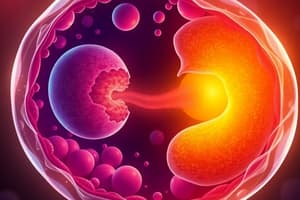Podcast
Questions and Answers
What is Developmental Biology (Dev Bio)?
What is Developmental Biology (Dev Bio)?
A relatively slow process of progressive change that includes the study of regenerative processes and the cellular and molecular basis of development.
What are the two major objectives of developmental biology?
What are the two major objectives of developmental biology?
- Focusing solely on external environmental factors
- Studying only the genetic components of development
- Ensuring life's continuity across generations (correct)
- Establishing cellular diversity and order within an organism (correct)
Which of the following is NOT a fundamental question in Developmental Biology?
Which of the following is NOT a fundamental question in Developmental Biology?
- What is morphogenesis?
- What is pattern formation?
- What are the processes of differentiation?
- How do we prevent diseases? (correct)
What concept involved a fully-formed miniature human thought to be present within reproductive cells?
What concept involved a fully-formed miniature human thought to be present within reproductive cells?
Preformationism is a theory that suggests reproductive cells contain pre-formed adult individuals.
Preformationism is a theory that suggests reproductive cells contain pre-formed adult individuals.
What term describes the theory that growth equals development?
What term describes the theory that growth equals development?
Flashcards are hidden until you start studying
Study Notes
Introduction to Developmental Biology
- Developmental biology studies progressive changes in organisms, including regenerative processes in species capable of regrowing lost body parts.
- Interdisciplinary field intersecting genetics, molecular biology, and evolutionary biology.
Fundamental Questions in Developmental Biology
- Major objectives include:
- Establishing cellular diversity and order.
- Ensuring continuity of life across generations.
- Key questions addressed:
- Differentiation: How do cells become specialized?
- Pattern formation: How are structures organized in the developing organism?
- Morphogenesis: How do organisms develop their shape?
- Growth: What controls the size of an organism?
- Reproduction: How are organisms perpetuated across generations?
- Regeneration: How can organisms restore lost structures?
- Environmental integration: How do organisms respond to their environment?
- Evolution: How do developmental processes relate to evolutionary changes?
Brief History of Developmental Biology
- Historical context from the 16th to 17th centuries:
- Concept of "homunculus": belief in a fully-formed miniature human residing in reproductive cells.
- Preformationism theory: asserted that reproductive cells held pre-formed adult individuals; development was merely growth.
- Some proponents of homunculus theory suggested each homunculus possessed its own reproductive cells, akin to a Russian doll.
- Theories of preformationism faced criticism from some biologists advocating for alternative developmental models.
Studying That Suits You
Use AI to generate personalized quizzes and flashcards to suit your learning preferences.




